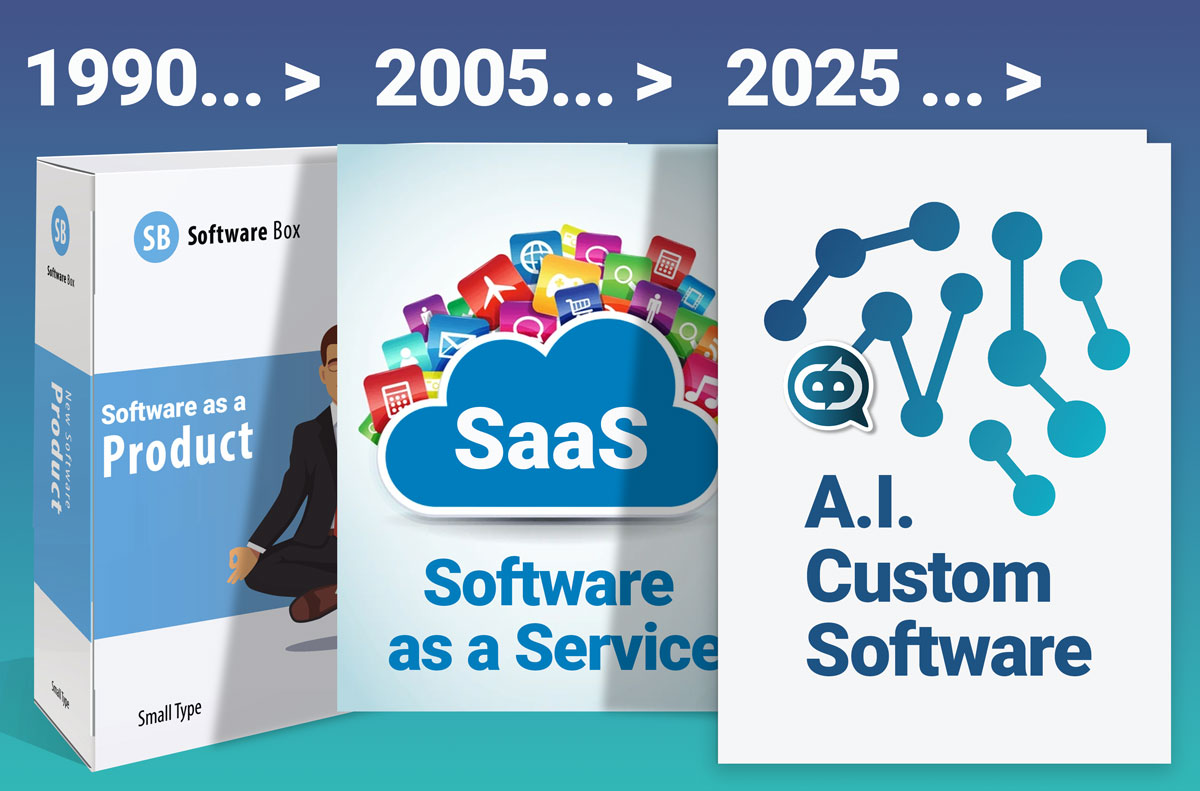Bespoke AI business software incoming
By Andy Mundell | Published: 09 September, 2025

Imagine replacing your entire tech stack with a single, custom, AI-driven, semi-autonomous operating system designed specifically for your business. Not a generic off-the-shelf app, but software built around your exact workflows, processes, and goals. Essentially, full enterprise-grade software on AI steroids—but instead of a six-figure investment, you’re looking at something in the $10K to $20K range.
To be clear, I'm not talking about Cleva.Bot today, or about science fiction. I'm talking about what's coming next in A.I. that will profoundly impact your business. It's not mainstream yet, but the shift is already underway, and the pace of improvement is staggering. Businesses that tune in early will likely find themselves with a serious edge over competitors still stuck in the traditional SaaS maze.
Why This Matters Now
For decades, businesses have relied on sprawling “tech stacks”: CRM systems, project management tools, accounting platforms, booking engines, chat tools, reporting dashboards… the list goes on. Each system works in isolation, and connecting them requires a patchwork of integrations, third-party connectors, or manual copy-and-paste.
AI changes this equation. A bespoke AI system can act as both the glue and the brain—automating workflows, reasoning across your data, and interacting naturally with your team.
Instead of hopping between five apps, you ask your AI system: “What’s our revenue this month compared to last year, and flag any overdue invoices?” and it just does it.
The Tools Making This Possible
Two major forces are converging:
Low-code/No-code platforms:
Replit, Lovable, n8n, Make, Bubble and similar platforms are transforming how software is built. You no longer need a team of specialist developers to spin up business apps. Drag-and-drop workflows, pre-built connectors, and *vibe coding mean that building complex tools is suddenly accessible to small businesses and solo founders. (*Vibe coding is a software development workflow using AI to generate functional code from natural language prompts).This democratisation is huge. It reduces development costs, shortens timelines, and makes iteration much more efficient. What once required a year-long dev project and $200K now looks more like a 4-week sprint for 5% of the cost.
Vector databases:
If low-code tools are the skeleton, vector databases are the nervous system. By converting knowledge into vectors—mathematical representations of meaning—these databases allow large language models (LLMs) to recall, reason, and act with context.Vector data is how Cleva.Bot performs expert-level conversations: it doesn’t just “predict words,” it understands the context of the information in its knowledge base and draws on semantically relevant insights to deliver meaningful answers and actions.
The Business Impact
Think about what this means in practice:
Tailored workflows – Your AI software isn’t built for “companies like yours.” It’s built specifically for your company, handling quirks, exceptions, and unique processes without forcing you into a cookie-cutter mold.
Cost efficiency – Instead of paying per seat for 8+ SaaS subscriptions, you invest once in your own system that scales with you.
Strategic agility – Need to pivot, add a new service line, or integrate a different data source? Your AI system can adapt quickly, without waiting on feature requests from a third-party vendor.
Competitive edge – As your competitors wrestle with fragmented tools, you’re operating from a single, intelligent hub that reduces friction and increases speed.
Not the Future—The Beginning
To be clear, we’re not at “push-button, get fully autonomous business OS” just yet. There are still limitations. Human oversight is crucial, and certain workflows remain too nuanced for complete automation. But the trajectory is obvious.
Today’s no-code platforms and vector-powered AI assistants (like Cleva.Bot) are the scaffolding of something much bigger: a world where businesses commission their own AI operating systems in the same way they’d once have commissioned a custom website.
The businesses experimenting now—those willing to invest in early bespoke AI systems—are laying the groundwork for the operating model of the next decade.
Bottom line: Bespoke AI business software isn’t just a trend; it’s the inevitable evolution of today's AI tech. If you’re running a small or mid-sized business, this is the moment to start asking: What could my own AI operating system do for me?
What’s Next for Cleva.Bot
At Cleva.Bot we’re building toward this future. Our mission has always been to evolve chatbots into high-capability, AI co-workers—systems that understand your business, respond with expertise, and actually take workload off your plate.
Cleva.Bot is already operating inside businesses to improve customer service, handle complex internal support queries and onboard new team members.
The next stage is to build on this with new integrations and autonomous agents that make it easier to create role-specific AI helpers to automate manual business functions. And we're not alone. We've also partnered with other vendors in this space, collaborating with them to build unique complex solutions. I'm excited by the opportunities ahead.
Watch this space!
Andy Mundell
Cleva.Bot Co-founder & Technical Director
+64-21-826-972 andy@cleva.bot






